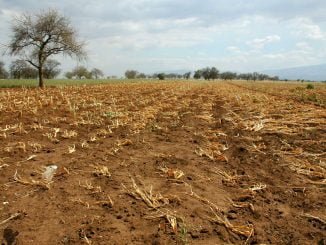
Kampala, Uganda | URN | The National Environment Management Authority (NEMA) says the recent cabinet decision which imposed a total ban on all polythene bags cannot be enforced under the current legal regime.
As part of the efforts to restore the environment in what has been dubbed as the restoration decade, the government decided to ban the manufacturing, importation, sell, use, distribution, or otherwise dealing in polythene bags locally known as Kaveera.
While declaring the government decision as taken by the cabinet which sat on Monday 26, July 2021, the State Minister for Environment Beatrice Anywar noted that the decision was to take immediate effect and ordered the concerned agencies to embark on implementation.
However, Arnold Waiswa Ayazika, the acting Executive Director of the National Environment Management Authority (NEMA), notes that the National Environment Act (2019) gives an exception for plastic carrier bags or plastic products made of polythene and propylene of above thirty microns.
“Until this is revised, the implementation of the ban is hard,” says Ayazika. “As of now, there is no legal backing for this decision. We are looking forward to operationalization of the pronouncements.”
Ayazika added that before implementation, they expect an action plan from the government which among other things will consider the necessary amendments of the existing laws.
The debate on banning polythene bags goes way back to 2000 when environmentalists, the ministry of health, and the Uganda Cancer Institute made it clear that Kaveera use is harmful both to the environment, human and livestock health.
After a long debate on the matter, the government started passing enabling Acts and statutes. By 2016, NEMA backed by police and the Uganda Revenue Authority launched the implementation of the ban. But it wasn’t long before the situation went back to normal.
Read Also: Cooking food in polythene bags persists in Uganda despite health hazards
According to David Kureba, the coordinator of the National Association of Professional Environmentalists (NAPE), the move by the government is in the right direction given the environmental damage that plastic waste is causing. Kureba however worries that even if the needed laws and regulations are put in place, implementation of bans might not be achieved.
“Over the years, environmentalists have warned about the effects of kaveera and advised the government to ban them, but there has been a dilly-daring as the matter involves heavy investments by the business community,” says Kureba. “Those interests have not changed and in no time the profit-oriented people will influence the government’s decision.”
The variation in implementing bans on polythene bags is particularly stark in East Africa save for Rwanda which has attracted widespread praise for its environmental leadership. In Uganda and Kenya, despite bans being announced on separate occasions, implementation has remained a great challenge.



